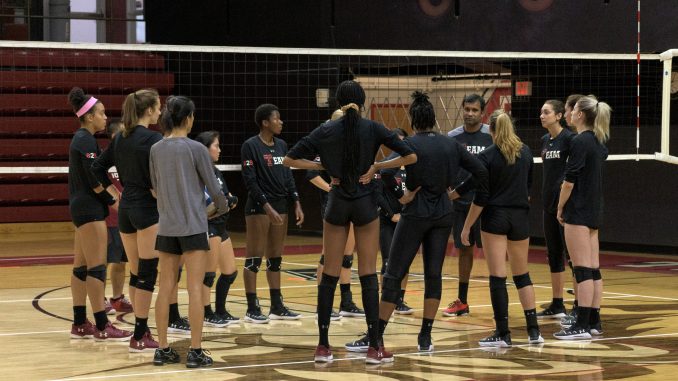
With extra months of preparation, a not-so-snowy winter break and a lot of planning, Temple University Athletics will balance fall and spring sports starting their regular season this semester. In total, they’ll have 12 different sports and 16 teams to manage.
The season of multitasking comes after a Sept. 16, 2020, approval from NCAA Division I Council to move the volleyball, cross country, men’s soccer, women’s soccer and field hockey championships to spring this year.
The 2021 spring sport season is manageable for the university, said Senior Associate Athletic Director for Strategic Communications Larry Dougherty. Their biggest hurdles will be instituting testing policies, scheduling games at different times and making sure they have an athletic trainer for each sport, he added.
“The major challenge is going to be the support staff, mainly athletic trainers and strength and conditioning coaches, who are going to have multiple sports to keep up with,” Doughtery said.
Athletic Training
Kevin Addison, associate director of athletic training, oversees eight athletic trainers within his department and is responsible for assigning trainers to teams. Each trainer has to attend all practices and competitions for their assigned in-season sport, but the trainers will have two in-season sports to manage this spring, Addison said.
Temple men’s and women’s basketball are the only sports with their own athletic trainers, while the rest of the staff will have two in-season sports competing this spring, Addison added.
Scheduling
After working with coaches and Senior Associate Athletics Director for Facilities and Event Management Lee Roberts, Addison coordinated a schedule overviewing each sports team’s practice time and competition play to guarantee the trainers’ assigned sport teams didn’t overlap with one another, he said.
“We had to sit down and figure out their schedule to make sure someone is available in case of an injury or an athlete needs to be looked at,” Addison said. “But the high-risk sports for COVID-19 take first priority over some of the lower risk sports as far as coverage.”
Testing
High-risk sports include basketball and volleyball because they have frequent close contact among all competitors during play and include touching of shared equipment, according to the NCAA’s COVID-19 protocol.
Soccer, field hockey, lacrosse and rowing are considered intermediate risk sports by the NCAA because of the short-lived proximity among all competitors. Cross country, gymnastics, tennis and track and field are considered low-risk sports because these teams can consistently maintain distance between competitors and teammates.
Testing procedures at Temple are different for athletes who play sports indoors and are in close contact with their opponents because there is a higher risk of transmitting COVID-19, Addison added.
The men’s and women’s basketball players will have two polymerase chain reaction tests and an antigen test a week, but that’s not a requirement for other teams, Addison said.
Intermediate risk sports have one PCR test per week and low-risk sports take a PCR test 72 hours before competition, Addison added.
If a student-athlete or staff member tests positive for COVID-19, the program will remain in quarantine for at least 10 days after their first positive test. If no symptoms have been reported during daily monitoring, the program can end quarantine after 10 days.
Temple Athletics will increase testing from one time a week to three times a week for the volleyball team once the Owls go into season, volleyball head coach Bakeer Ganesharatnam said.
The NCAA requires a mask to be worn for all athletes and staff members during volleyball competition and anytime inside the gym, according to the NCAA COVID-19 protocol.
Women’s soccer midfielder Julia Dolan is confident in her coaches, trainers and the rest of the staff to make sure Temple Athletics keeps athletes safe, she said.
“As of right now, we get tested every Monday and once the season starts we’re going to get more testing,” Dolan said.
Facilities
Each sport has their own facility for practice, but Roberts and his staff had to figure out the facility usage for competitions, he added.
McGonigle Hall will host women’s basketball, gymnastics, fencing and volleyball competitions this spring.
Roberts also planned doubleheaders when creating the schedule, meaning two teams who share the same field would be scheduled on the same day, but within two different time brackets.
“We’ll see later on in January a women’s basketball game on the same day as a volleyball match, that will only take two hours to set up and disinfect,” Roberts said. “I couldn’t do a basketball game backed up with gymnastics because gymnastics takes about four hours to set up.”
Scheduling away games is another area of concern for Roberts and his crew, he said.
“The decision came down to creating as many games with as minimal travel as possible,” Roberts said.
Despite the planning they’ve implemented with testing and scheduling, Roberts is aware all of it could change at any time if there is a positive COVID-19 case in one of Temple’s programs or an opponent’s program, he said.
“The number one thing we did as a group was come up with the motto, ‘You just have to be flexible,’” Roberts added.


Be the first to comment